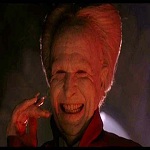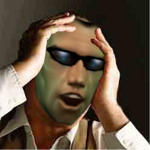|
QuantumNinja posted:Dungeon World does this with a combination of the first three with the Cast a Spell move (though the first of the three choices should probably be removed), a hyper-limited prepared spell list (if you're casting a level 9 spell today, you only get to prepare a level 1 next to it), and removing all of the hyper-dumb spells. It also did the last, providing the fighter things like Bend Bars, Lift Gates and Through Death's Eyes, which allow them to rewrite reality in a way a wizard cannot. It's also worth looking at some of the brilliant player-made classes for Dungeon World, such as the Mage and its more specialized variants. The Mage is limited mostly by language and the cost of what it can do, rather than by a list of spells. You have a sort of domain over which you're really skilled, a few broad areas you're not allowed to cast spells in, and a move called Cast a Spell that pretty much gives you carte blanche to make up a spell "to help solve a problem." Of course, that means it has to be cast in relation to a problem, and that it can only help solve it and not outright bypass it; plus, rolling anything other than a 10+ is just asking for trouble. It sounds amazingly powerful, but in practice it's limited in exactly the sort of way that encourages player creativity without ever breaking the narrative. The same person who made the Mage (SA poster gnome7) also made a bunch of really cool specialized Mages who similarly lack spell lists. Instead, they use the same move/advanced move system as every other class--it's just that their moves tend to be inherently magical. They end up feeling like characters for whom magic is just a part of who they are, and their moves let them break reality in really cool, weird, and unexpected ways, but it's all within the confines of one specialized area, and none of it outclasses what more "mundane" classes do. Dungeon World (and its players) is pretty rad for that kind of thing. Even if a super-narrative system like that isn't your bag, it's got tons of examples of how to make sure every player can affect the narrative in a satisfying way, while also accommodating a huge selection of fantasy archetypes.
|
|
|
|

|
| # ? May 20, 2024 23:50 |
|
I made a giant nerd essay about this a year or two ago but the primary problem - the root of the issue, not the myriad of branches - is how magic is seen via design philosophy. The problem isn't single spells that destroy balance (because there will always be more spells) or limiting the wizard casting (because even if it's just 3/day, 3/day demanading the entire plot stop and do what you say is pretty nice), it's the underlying design that leads to those things. Someone else here called it out as "magic is being used as a keyword system." Simply put, magic is everything. Literally everything is a spell first, an effect in-world second. Easiest example - genies do not grant wishes, they cast the Wish spell. This is what lead to every major enemy in 3.x being a wizard in funny clothes. Balor was a wizard. Dragons were wizards. Etc, etc. 3e didn't start this incidentally, it just peaked it; even in AD&D, Conan was statted out as having psionic powers because his ability to Not Be Surprised and Not Immediately Be Killed By Wizards didn't exist as character abilities. Because everything is a spell first. And you're going to see the exact same thing in 5e. You already are in fact. Paladins no longer smite; they cast the Smite spell. Monks don't twist and move the elements with their unity with the world, they just learned a funny way to cast wizard spells The wizard fits in, naturally, by being The Magic Guy. And if everything is magic?
|
|
|
|
treeboy posted:edit2: furthermore the assumption that 4e works simply because Wizards and Fighters work off the same basic mechanical concept of at-will/encounter/daily is the dumbest poo poo i've ever heard. Yeah I agree here; 4e's balance isn't really tied to the way powers are structured. Comparing Fighter and Wizard, Wizard dailies are much stronger and can end encounters on their own when used right. But they only have 3 of those. Really what I think 4e did best as far as balance is concerned is limit the scope of wizard spells to very strong combat status effects (putting the big stuff into rituals anyone with a feat could access) while also limiting how many of those it could use between rests.
|
|
|
|
ProfessorCirno posted:I made a giant nerd essay about this a year or two ago but the primary problem - the root of the issue, not the myriad of branches - is how magic is seen via design philosophy. The problem isn't single spells that destroy balance (because there will always be more spells) or limiting the wizard casting (because even if it's just 3/day, 3/day demanading the entire plot stop and do what you say is pretty nice), it's the underlying design that leads to those things. Its kind of weird and telling when we have mythic heroes who just sort of did crazy poo poo and there wasn't a lot of explanation behind it but now we want to categorize these things into neat, orderly compartments of 'magic' and 'not magic'. So.. why the gently caress can we not have dudes who just do thing good? Some sort of idealization of the gritty murderhobo who's expected to die? This culture is so tainted by its predecessors.. edit: what the gently caress did I just type Strength of Many fucked around with this message at 22:51 on Aug 27, 2014 |
|
|
|
What kills me is that all this discussion is about a problem that the previous edition of the game solved completely that the current edition brought back for no goddamn reason. Speaking of loving terrible things ended by the previous edition that the current edition brought back for no goddamn reason, could somebody please explain to me the appeal/game design goal of rolling for hit points on level up? Rolled attributes are terrible, but people who enjoy or defend them do exist. I have never once heard anyone even attempt a coherent defense for random hit points. So why are they back?
|
|
|
|
treeboy posted:you're right, Wizard scope is not 100% of the problem, it is about 80-90% of the problem however. Fighters need more ability to affect the narrative, you are correct. They do not need (nor does any class really) the ability to literally dictate the events that will unfold for everyone else. 4e did not magically grant fighters narrative control powers to reshape the cosmos or obviate whatever they felt. It increased their bag of tricks, within the confines of the combat/skill system, and brought casters down to be on par with them. Wizard scope is 0% of the problem. This is easily demonstrated: limit a 5e wizard exclusively to spells which deal hitpoint damage on a failed save (fireball, cone of cold, etc). It's still stronger and cooler than a 5e fighter, possessed of greater importance and narrative agency. 4e didn't actually bring the wizard down, except in haggling-over-minor-details terms where like it now takes 1 hour to teleport directly to heaven rather than 1 standard action. The variety of actions available to the wizard was, if anything, greater in 4e because of the flexibility that multiclassing and paragon paths allowed - you could much more easily make an undead slaying wizard or a healing wizard in 4e than in 3e or 5e, for instance. It's stupid to blame 5e's problems on Wish or Plane Shift or Invisibility or any combination of potential spell effects castable by the same character in the same day. It betrays a cargo cult understanding of game balance, an ignorance of the way that fundamental resolution systems affect the experience. It would be no harder to write an important and empowered 5e martial hero than it was to write the importand and empowered 5e arcane hero. It's just that no one's done the work on the former, and massive amounts of effort have been spent on the latter.
|
|
|
|
ProfessorCirno posted:I made a giant nerd essay about this a year or two ago but the primary problem - the root of the issue, not the myriad of branches - is how magic is seen via design philosophy. The problem isn't single spells that destroy balance (because there will always be more spells) or limiting the wizard casting (because even if it's just 3/day, 3/day demanading the entire plot stop and do what you say is pretty nice), it's the underlying design that leads to those things. Why is this not a problem in 4E? Replace the word "spell" with "power" and you have the same thing.
|
|
|
|
Ederick posted:Why is this not a problem in 4E? Replace the word "spell" with "power" and you have the same thing. Because fighters get powers in 4e. What 3e and 5e D&D aren't willing to admit is this: they're basically Exalted. That is to say, they're an immersive fantasy world that works on the interaction of a gigantic pile of MtG-style exception-based mechanics. There aren't really universal abstract action resolution systems, there are a thousand and one different Charms(powers in 4e terms, spells in 3e and 5e terms) that control and describe everything that can happen. There's nothing really wrong with this, although it's not to everyone's taste. But, like, if you're going to express all of fantasy in terms of bite-sized fire and forget powers, you have to express all of fantasy like that, not just the parts that glow.
|
|
|
|
Ederick posted:Why is this not a problem in 4E? Replace the word "spell" with "power" and you have the same thing. No, you don't have the same thing, for several reasons. The differences between powers and spells go far beyond what you call them. No class has exclusive access to powers; every character, regardless of class, gets pretty much the same number, and they all use them the same way, so there is no way to make a character that is "the guy that uses powers" the way casters in prior editions were defined as "the guy that uses spells." (Characters are differentiated by the effects of the powers they get, not by their access to powers.) Additionally, the keyword "spell" has narrative implications in addition to the strictly mechanical meaning that the keyword "power" does not. This becomes pretty clear when you play 4th edition. Bongo Bill fucked around with this message at 23:09 on Aug 27, 2014 |
|
|
|
Ferrinus posted:There's nothing really wrong with this, although it's not to everyone's taste. But, like, if you're going to express all of fantasy in terms of bite-sized fire and forget powers, you have to express all of fantasy like that, not just the parts that glow. Makes sense. The way Cirno phrased it made me believe he thought the entire concept was poisonous.
|
|
|
|
treeboy posted:4e did not magically grant fighters narrative control powers to reshape the cosmos or obviate whatever they felt. It increased their bag of tricks, within the confines of the combat/skill system, and brought casters down to be on par with them. Other people brought this up, but I want to really hone in on it: most of the reality-control stuff became rituals, which anybody could learn to cast, and which therefore functioned more as a party resource than how wizard spells typically operate. So, no, fighters were granted narrative control powers to reshape the cosmos. Like, your chart basically suggests that there is a general limit to how much agency players should have. That seems kind of silly.
|
|
|
|
Generic Octopus posted:Yeah I agree here; 4e's balance isn't really tied to the way powers are structured. Comparing Fighter and Wizard, Wizard dailies are much stronger and can end encounters on their own when used right. Actually I wasn't even referring to that. I meant that both fighter and wizard powers/abilities/etc all existed in the same framework of push, pull, blast, shift, slide. Keyworded powers. Sustain. Aftereffect. On a miss. Daze/stun. That sort of thing - all the Things Powers Could Do were available to everyone in the conceptual space.
|
|
|
|
To be fair, 4e did favor magical characters over nonmagical characters outside of combat because A) everyone had skills but only magic-users (including, here, fighters who bought the "ritual caster" feat) had rituals, and B) rituals had way more page space devoted to their concrete effects and idiosyncracies than skills did. What 4e needed to do was, like, keep the list of ritual effects in place, but allow for wide (and mechanically-supported) narration in the style or praxis or whatever of whoever was invoking the ritual effect, so a wizard would cast Plane Shift by drawing a huge ritual circle of residuum and chanting for hours, but a ranger would seek out Plane Shift by leading their party into the depths of the mythic wilderness and through a naturally-occurring planar fissure they'd found with wilderness lore. Meanwhile a rogue either steals a bunch of magical objects and bullshits their way into causing a portal to open, or pulls string after string until they're calling in shady favors from devils or elemental lords.
|
|
|
|
Rituals could definitely have used more structure. I would have been happy to see them silo'd off into discrete paths where everybody got a few to choose from. We ended up not using them much in the 4e campaign I played in because managing them and their implications was more unwieldy than we wanted to bother with.
|
|
|
|
Sir Kodiak posted:Rituals could definitely have used more structure. I would have been happy to see them silo'd off into discrete paths where everybody got a few to choose from. We ended up not using them much in the 4e campaign I played in because managing them and their implications was more unwieldy than we wanted to bother with. I don't know anyone who didn't just ignore the costs. Also, martial practices were a cool thing that didn't get enough (any) support. Unrelated, Mearls is now actively contradicting the rules as written, not just declaring ambiguities up to your DM.  Page 175 posted:trying to open a lock requires proficiency with thievesí tools
|
|
|
|
Ederick posted:Makes sense. The way Cirno phrased it made me believe he thought the entire concept was poisonous. I think it's poisonous in D&D because of a) the narrative force behind everything being a "spell" (which is what leads to, as Gygax called it, the Weird Wizard Show), and b) because it remains the domains of some classes and not all. These two combine in further unhealthy ways. Like, "everything" in 4e, largely, is a power, but there's no "Powers Class," and "powers" are not literal in-universe constructs (which is what drove the whole DISAOCISCSAISCIETED MECHANICS lobby). In 3e/5e, there ARE designated "spell classes," and "spells" are literal in-universe constructs that can objectively be examined and understood, which leads to a patiently stupid rendition of Order of the Stick's whole meta-joke, only taken dead seriously. It's also what feeds the whole "wizard supremacy" thing where people actually do think wizards have to be The Best class, because everything is a spell, ergo ProfessorCirno fucked around with this message at 23:46 on Aug 27, 2014 |
|
|
|
So, speaking of spells being better than class features Slow Fall (Monk class feature): quote:Beginning at 4th level, you can use your reaction when you fall to reduce any falling damage you take by an amount equal to five times your monk level. Feather Fall (level 1 Bard/Sorc/Wizard spell) quote:Action: 1 reaction Rules for falling: quote:At the end of a fall, a creature takes 1d6 bludgeoning damage for every 10 feet it fell, to a maximum of 20d6. The creature lands prone, unless it avoids taking damage from the fall. So a level 4 monk can hope to survive a 80 foot fall, landing prone. A level 1 wizard, and his entire party, can survive 1200 foot fall, all landing on their feet. An unhurt level 20 monk will survive a 1200+ ft fall, but still has a chance of taking damage and falling prone.
|
|
|
|
ProfessorCirno posted:In 3e/5e, there ARE designated "spell classes," and "spells" are literal in-universe constructs that can objectively be examined and understood, which leads to a patiently stupid rendition of Order of the Stick's whole meta-joke, only taken dead seriously. Right. Good example: A sphinx can't speak all languages just by being a sphinx. It can cast Tongues. And the Wizard can Counterspell that if he wants and leave the Sphinx unable to recite its riddles. Jack the Lad fucked around with this message at 23:55 on Aug 27, 2014 |
|
|
|
ProfessorCirno posted:Someone else here called it out as "magic is being used as a keyword system." Simply put, magic is everything. I'm glad I was able to contribute. Ederick posted:Why is this not a problem in 4E? Replace the word "spell" with "power" and you have the same thing. Because 'power' doesn't have the broken connotation that 'spell' does. In D&D, 'magic' and 'spells' are anything beyond the natural to the point where monsters in 3rd ed had to be described as having 'spell-like abilities' rather than just doing a thing that they did. (In fact, the problem isn't even that that was happening because the designers probably intended it just as shorthand to keep them from writing powers out over and over.) The ranger is preternaturally good at healing, why is that? She must be able to cast magic, because that's the only thing that can enable power of that level right? It's ludicrous. And conflating divine power with magic made the problem much deeper. Doing that in the real world is heretical or borderline heretical in most religions. But the fact that Clerics cast spells is deeply ingrained in most editions of D&D forcing the word magic into the thought space 'anything that is beyond natural' rather 'one category of thing that is beyond natural'. I think it's clear that 4th edition solved the bad connotation problem of 'magic spells' completely.
|
|
|
|
Ferrinus posted:Wizard scope is 0% of the problem. This is easily demonstrated: limit a 5e wizard exclusively to spells which deal hitpoint damage on a failed save (fireball, cone of cold, etc). It's still stronger and cooler than a 5e fighter, possessed of greater importance and narrative agency. What the gently caress are you smoking. You're complaining about narrative control then saying power scope and versatility has nothing to do with the issue? People are specifically attempting to demonstrate broken mechanics through complex series of spells like teleport invisibility and polymorph. I'm not talking about resolution mechanics, I'm talking sheer ability to affect the game world in diverse ways which is all about spells like invisibility and polymorph. Whether the wizard hits with fireballs or the fighter attacks eight times a round doesn't matter if the wizard can fly around the encounter. That's what scope and versatility bring and it's the root issue of the wizard problem. Bring that down a notch (like 4e did through well written spells and rules with explicit language) and you're left with simply balancing dpr
|
|
|
|
Jack the Lad posted:Right. Good example: A sphinx can't speak all languages just by being a sphinx. It can cast Tongues. And the Wizard can Counterspell that if he wants and leave the Sphinx unable to recite its riddles. This part is weird because they have gone out of their way to make unique abilities on some monsters but on others they clearly gave up and stapled a spell list onto them.
|
|
|
|
treeboy posted:What the gently caress are you smoking. You're complaining about narrative control then saying power scope and versatility has nothing to do with the issue? People are specifically attempting to demonstrate broken mechanics through complex series of spells like teleport invisibility and polymorph. Actually, I'm saying the scope and versatility of the wizard has nothing to do with the issue, and that reducing the wizard's scope and versatility will solve nothing and make the game worse. There is no problem with wizards; there is a problem with fighters. If both fighters and wizards got powers, rather than only wizards getting powers, it wouldn't matter if either class's power list was really broad at PHB1's release because a framework would exist for giving both character types equivalent power over the game.
|
|
|
|
Jack the Lad posted:Right. Good example: A sphinx can't speak all languages just by being a sphinx. It can cast Tongues. And the Wizard can Counterspell that if he wants and leave the Sphinx unable to recite its riddles. I kind of want to play a wizard who only uses counterspell in every slot in order to frustrate everything he encounters.
|
|
|
|
The problem with Wizards is that Wizards are fuckin rad as hell, gently caress that stupid sphinx
|
|
|
|
Ferrinus posted:What 4e needed to do was, like, keep the list of ritual effects in place, but allow for wide (and mechanically-supported) narration in the style or praxis or whatever of whoever was invoking the ritual effect, so a wizard would cast Plane Shift by drawing a huge ritual circle of residuum and chanting for hours, but a ranger would seek out Plane Shift by leading their party into the depths of the mythic wilderness and through a naturally-occurring planar fissure they'd found with wilderness lore. Meanwhile a rogue either steals a bunch of magical objects and bullshits their way into causing a portal to open, or pulls string after string until they're calling in shady favors from devils or elemental lords. Meanwhile, the fighter grabs at a minuscule tear in reality with both hands and forces it open with the sheer power of swole.
|
|
|
|
Ferrinus posted:Actually, I'm saying the scope and versatility of the wizard has nothing to do with the issue, and that reducing the wizard's scope and versatility will solve nothing and make the game worse. There is no problem with wizards; there is a problem with fighters. If both fighters and wizards got powers, rather than only wizards getting powers, it wouldn't matter if either class's power list was really broad at PHB1's release because a framework would exist for giving both character types equivalent power over the game. Giving fighters powers is necessary, but it's wrong to say that wizards don't have a problem. Wizards don't have powers either. Powers don't exist in 5e. What exists in 5e are spells, and spells, with their arbitrary mechanical scope and pernicious narrative role, aren't really a "framework" for anything.
|
|
|
|
Slimnoid posted:Meanwhile, the fighter grabs at a minuscule tear in reality with both hands and forces it open with the sheer power of swole. I'd call that a sorcerer. A fighter would probably need, say, a sword cooled in the blood of a creature from the target plane that they then swing in a precise pattern through the air at an already-unstable location. Or, maybe they go to a crossroads at midnight, draw their weapon, and issue a formal challenge to duel to some guard or monster from wherever they want to go. Bongo Bill posted:Giving fighters powers is necessary, but it's wrong to say that wizards don't have a problem. Wizards don't have powers either. Powers don't exist in 5e. What exists in 5e are spells, and spells, with their arbitrary mechanical scope and pernicious narrative role, aren't really a "framework" for anything. I mean, I'd probably make the spell list a little more generic and offload things like spell components to specific classes, but it's certainly not unworkable as-written. If wizards, pit fiends, and elementals all use "Fireball" for 8d6 damage in a 20' area, well, fine - that's just how explosions of magical fire work in this universe. What we need is an equivalently detailed list of staff techniques, ponzi schemes, breathing exercises, etc.
|
|
|
|
Ferrinus posted:A wizard who could only cast odd-numbered spells from a single school of magic would still leave the fighter looking stupid because the problem! Isn't! The wizard's! Versatility!!! And 5e has made this worse with its ritual rules. A Catastrophe fucked around with this message at 00:48 on Aug 28, 2014 |
|
|
|
Grim posted:The problem with Wizards is that Wizards are fuckin rad as hell, gently caress that stupid sphinx I think that narrative power going to the wizard is only a big problem if you are paying with big babies who all want to hold the shiny toys at the same time. Most parties i've been in have been happy to allow the Wizard to do the mystic spooky stuff because that's how it works in most fantasy settings. I guess it largely depends if your game is oriented towards Table-Top Combat Simulator or toward Role Playing Game
|
|
|
|
The social environment at the table can prevent any game's problems from causing anything unfun. However, that's not a defense of the game. You can even enjoy playing Monopoly, but that doesn't make it good.
|
|
|
|
Serdain posted:I think that narrative power going to the wizard is only a big problem if you are paying with big babies who all want to hold the shiny toys at the same time. I guess if you're playing a more social, casual game without much story or character where you just roll the dice when your turn comes up and whatevs, it isn't such a big deal. A Catastrophe fucked around with this message at 00:54 on Aug 28, 2014 |
|
|
|
A Catastrophe posted:One of the key issues is that one day the wizard can chump on the rogue, and then come back the next day (or ten minutes later) and do the same thing to the fighter. It's not just that a wizard is better than another class, it's that they can be better than any of them with a ritual or re-memorize. Hypothetically, a rogue can chump on a fighter by sneak attacking a creature to death, then chump on an illusionist wizard by using disguise and ventriloquism, then chump on a conjurer by sneaking or climbing past physical obstacles and using the same tricks to bring in hired thugs, then chump on a diviner by spying on people or drawing on their underworld contacts, and so on and so forth. These are pernicious lies, of course, but it's not because a rogue should have to choose between being good at killing people, and between being good at getting information, and between being good at getting places - it's because rogues can't actually do any of those things, because they don't have powers. They just have DM-begging in the form of fuzzy, unreliable skill checks. Strictly speaking, wizards in a truly egalitarian 4e would have to become less versatile purely because there would be less raw page space for spells because the book would have to make an honest effort to provide a robust and powerful list of exploits (or "tricks" or "quests" or whatever, you could get pretty creative here) as well, but casting four spells from four schools as opposed to four spells from two schools isn't the issue, and neither is the ability to cast four spells from four different schools after a long rest.
|
|
|
|
Serdain posted:I think that narrative power going to the wizard is only a big problem if you are paying with big babies who all want to hold the shiny toys at the same time. Games I've been in where casters/magic has been supreme (Shadowrun 4e, D&D 5e, games of D&D 4e where people were using hyper optimized builds alongside normal ones, some other I can't think of off hand) have always ended up dead because no one liked playing second fiddle to the guy who wrote "does magic" on his/her sheet. That's nothing to do with people being babies, and everything to do with the fact that if someone/something can render you unnecessary on a whim, then you might as well have not shown up to play because you're contributing basically nothing.
|
|
|
|
So.... not having healers are viable in a party? Or are they essential to party set up?
|
|
|
|
Ferrinus posted:Strictly speaking, wizards in a truly egalitarian 4e would have to become less versatile purely because there would be less raw page space for spells because the book would have to make an honest effort to provide a robust and powerful list of exploits (or "tricks" or "quests" or whatever, you could get pretty creative here) as well, but casting four spells from four schools as opposed to four spells from two schools isn't the issue, and neither is the ability to cast four spells from four different schools after a long rest. Wizards right now can cover every possible niche, and shift niches given at worst 8 hours. Adding everyone else to that does not solve the problem, it just makes it more comical. Ok cool, now EVERYONE CAN CAST THAT PLANAR PORTAL. Congrats, congrats, are they going to draw straws? It doesn't really matter who does it because everyone can do it. And not every class. Every build. You don't even decide to create a planar portal or not when you level up- using 5e wizard logic on all classes, all classes will have a planar portal in their back pocket. And they might not even need to memorize it. You know as well as I do that 4e Wizards are too versatile, and they're too versatile specifically because some of the devs wanted them to be overpowered, 3e style wizards.
|
|
|
|
Kortel posted:So.... not having healers are viable in a party? Or are they essential to party set up?
|
|
|
|
mastershakeman posted:I kind of want to play a wizard who only uses counterspell in every slot in order to frustrate everything he encounters. 'No', the Mage whispers to the evil Lich and then points to the Fighting Man, 'You will fight him!'
|
|
|
|
A Catastrophe posted:What you're seemingly proposing is a game where everyone can do everything and class and even character creation doesn't matter. Every class, yes, every build, no. I want to see broad lists of powers but a limit as to how many powers you can have prepped at once and a wider but still existent limit on how many powers you can have in reserve and preppable given a bit of time (a long rest, a couple days) as opposed to given some kind of in-character retraining sequence (a month's training, a religious awakening). Character specialization could make certain kinds of power more flexible or reliable, so like any wizard could make someone go glow-eyed and slack-jawed and start mindlessly obeying orders, but only a specialized mesmerist could actually hope to keep the king under telepathic control without anyone catching on. Whether every single PC of level 15 and above can reach another plane under their own power is really a matter of genre (I could see it being a specific ability you have to unlock and pay for as opposed to just something you can access as soon as you're tall enough, 4e ritual caster style), but even if it was automatically and universally available, the way it's costed and written up could serve to make it non-trivial and context dependent. If you're in Sigil, for instance, the streetwise rogue is probably going to be the party member who facilitates planehopping, even if the wizard, fighter, and cleric, were they stranded, all had ways of muddling through.
|
|
|
|
A Catastrophe posted:Healbots are back, yes. Should be an interesting game then. No healers. Guess I could hire a cleric. Three casters, one fighter and a monk at level 1.
|
|
|
|

|
| # ? May 20, 2024 23:50 |
|
Hi I think that this is relevant to the thread's interests okay bye.
|
|
|























